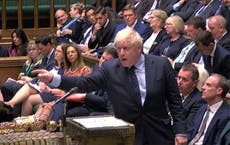The Lib Dems are so desperate to stop Brexit they’ll let anyone in – there’s nothing liberal about Dr Philip Lee
If Lee – who refused to vote in favour of gay marriage – is allowed into the party, what is it even for?

One of the most pivotal weeks in British political history was sent into overdrive by the defection of Dr Philip Lee to the Liberal Democrats. The surprise move by the Bracknell MP, which leaves Boris Johnson’s government without a majority, took the wind out the new prime minister’s sails as he made one final attempt to persuade Tory rebels to back his government.
As Johnson spluttered and paused, it’s likely some Tories wondered why they bothered getting rid of Theresa May – who sat beaming from the back benches as the sharks circled around her replacement.
But soon a backlash against the decision started to rumble. The Lib Dem’s LGBT+ chair, Jenny Rigby, tweeted to say she had resigned from the party. She told BuzzFeed News that Lee’s voting record proved he was “not a Liberal”, saying he has “problematic” views on gay rights and HIV migrants.
Rigby tweeted to say she had informed “the powers that be” beforehand that she would resign if Lee was allowed to join the party, but her objections were ignored.
And she’s not the only one. Lib Dem Alisdair McGregor said: “I am not going to welcome Philip Lee to the Liberal Democrats; his statement is entirely about Brexit, and fails to address the deeply illiberal policies on LGBT+ issues and immigration he has championed in the past.” Former Lib Dem Luke Graham said: “Today is my last as a Liberal Democrat. The rolling out of the red carpet for Phillip Lee has shown me the party lacks even the most basic of values it espouses in its constitution.”
The backlash against Lee’s defection is understandable – for these members, Philip Lee’s views simply can’t be reconciled with the Lib Dems they joined. But as the tectonic plates of British politics have shifted rapidly over the last few years, the question of what makes a Liberal Democrat has become more complex to answer.
Currently, the party is desperate to focus on stopping Brexit. This is a good strategy as it puts clear ideological distance between them and their former coalition partners. Yet many voters – particularly those who ended up paying trebled tuition fees or work in public services – reject the idea that the Lib Dems are exceedingly “liberal”, as their economic approach has suggested otherwise. Can you really be “socially liberal” while presiding over cuts? With these doubts in mind, accepting politicians like Lee and former Tory Sarah Wollaston, who helped to further the Conservative Party’s austerity agenda, is a risky game.
But there are benefits too. In a general election, under First Past the Post, the Lib Dems benefit far more from seeming like a welcoming home for former Tories than seeming like a Corbyn-lite Labour alternative. On the list of 60 Lib Dem target seats for the next election, 48 are currently held by Conservatives and just nine are held by Labour.
The danger here is that the Lib Dems risk losing what they claim to have always stood for: social liberalism. To be a “liberal” democrat, you would think that the party’s new MPs would at least have to be socially liberal to qualify. The party’s worst years in the wilderness came after their 2015 wipe out, when former leader Tim Farron spent two years publicly flip-flopping on whether he thought gay sex was a sin. But even Tim Farron, the sodomy-obsessed maniac himself, generally voted for extending LGBT+ rights and for same-sex marriage. On a backdrop of his thoroughly illiberal views, it is a miniscule saving grace.
The same, however, cannot be said for Dr Philip Lee. Lee refused to vote for equal marriage and also tried to amend the Immigration Bill in 2014 to make immigrants demonstrate they are clear of HIV or Hepatitis B before entering the UK. Blocking immigrants with HIV is an idea that has long been supported by UKIP-turned-Brexit-Party leader Nigel Farage – a far cry from the Lib Dem position.
For LGBT+ people like me, it has been heartening to see a rare parliamentary consensus among the leading parties in Westminster supporting LGBT+ rights in recent years. But as politics becomes more fraught and divisive, cracks are beginning to emerge. The UK has slid down Europe’s LGBT+ rights ranking to seventh place and dangerous views are trickling into the mainstream once more.
The Conservative Party aligned itself with the shockingly homophobic DUP. The political response to the homophobic protests outside schools has been shameful, and the very existence of gay people has been put back up for “debate”. Brexit Party MEP Anne Widdecombe voiced potential support for science finding an “answer” to curing homosexuality.
On the policy front, the UK government has kicked proposed amendments to the Gender Recognition Act, following an extensive public consultation, into the long grass. There are even reports that Downing Street has been polling “culture war” issues like transgender rights to weaponise them against Labour in its northern working-class heartlands.
For all of the party’s faults, this makes having a Liberal Democrat party vouching for the rights of all LGBT+ people even more vital. The Tories like to preach about bringing same-sex marriage to the UK, but this would never have passed through the commons had it not been for near universal support from Labour and the Liberal Democrats – who at the time were the third largest party in Westminster. Likewise, when the majority of Tories voted against or abstained on the bill to bring same-sex marriage to Northern Ireland, support from the Lib Dems, SNP and Labour got it over the line.
The introduction of Lee to the Lib Dems doesn’t necessarily hint that the party’s socially liberal stances – with regards to LGBT+ rights or other areas – will change. I was thrilled to see Swinson recently say, without doubt or fanfare, that trans women are women. But while her vocal support for the community is valuable, it’s important that her actions speak as loudly as her words.
The short-term electoral and political gains of letting Tories like Lee join the Lib Dems might seem alluring, but Swinson should be careful that she doesn’t erode the social liberalism her party claims to have always stood for. Because for LGBT+ voters like me, bringing Lee into the fold feels like another worrying sign of how easily our concerns can be brushed aside when a bigger prize is dangled in front of politicians.





Join our commenting forum
Join thought-provoking conversations, follow other Independent readers and see their replies